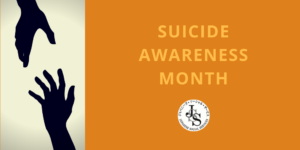COUNSELLOR’S CORNER: September is Suicide Awareness Month
Information compiled by Yuka Sato-Atiyota, MSW, RSW, and JSS Board Member

September is Suicide Awareness Month, and World Suicide Prevention day was September 10th. The main message of the World Suicide Prevention Day campaign is: Take a Minute.
- Take a minute to notice what is going on with you, your family, your friends and your colleagues.
- Take a minute to reach out and start a conversation if you notice something is different.
- Take a minute to find out what help is available for both you and others.
So let’s take a minute to educate ourselves about suicide, prevention strategies and resources.
Stigma surrounding suicide makes the issue difficult to talk about and often stops us from doing what we can do to help prevent a loss of life. People are also hesitant to intervene because they are not sure what to say and are afraid they will make the situation worse. Evidence shows that a genuine offer of support and compassionate non-judgmental listening are more likely to reduce distress rather than exacerbate it.
Statistics
- 800,000 people are lost to suicide across the world yearly.
- In Canada, there are 10 suicide deaths and 250 more suicide attempts on a daily basis.
- Suicide is one of the top ten causes of death in Canada.
What are the causes?
Evidence has indicated that one of the most common risk factors for suicide is a diagnosis of a mental health problem or illness. According to the recent statistics, of the approximately 4,000 deaths by suicide each year, more than 90% were living with a mental health problem or illness.
People who die by suicide don’t necessarily want to end their lives. They often want to stop significant or unbearable mental, emotional or physical pain. They want to end their suffering or put an end to a situation that seems overwhelming to them.
What are the signs?
Warning signs that might suggest that you or someone you know is at risk of suicide include:
- thinking or talking about suicide
- having a plan for suicide
Other signs and behaviours that might suggest that someone is at risk of suicide include:
TALK about
- Having no reason to live.
- Feeling trapped or that there is no other way out of a situation, or no chance of improvement.
- Being in unbearable pain.
- Being a burden to others
MOOD
- Significant mood changes.
- Depression.
- Loss of interest.
- Anxiety.
- Sense of helplessness.
- Irritability.
- Rage.
- Feelings of shame or humiliation.
BEHAVIOUR
- Increasing substance use, like drugs, alcohol and inhalants.
- Withdrawing from family, friends, or activities.
- Engaging in high risk behaviour.
- Giving away prized possessions.
What can be done?
Fortunately, programs and strategies are available that can make a difference.
If you think YOU are at risk of suicide yourself:
Thinking about suicide is not shameful or a sign of weakness. Please remember – seeking help to address suicidal thoughts or a related mental health issue is an indication of your strength and resiliency.
- Start a conversation – If you think that you might do something to hurt yourself, tell someone. Make sure you are around someone you trust. If you live alone, ask a friend or family member to stay with you. Connect with professional help if needed. If you don’t know anyone or can’t reach friends or family members, call your local crisis line. Try and think about it as any other conversation. You can describe what has happened, how you feel and what you help that you think you need. Ask for help to find support; in person, online or over the phone.
- Make a call – If you feel you are at imminent risk of harming yourself, call 911 or go to the local hospital emergency department.
- Have a safety plan.
- Keep your home safe by getting rid of ways to hurt yourself.
- Remember things that have helped in the past.
- Get treatment for mental health concerns.
- Identify high-risk triggers or situations.
- Think of reasons for living.
- Self-care: Take good care of yourself, including doing things you enjoy.
- Remember:
- Suicidal crises are almost always temporary.
- Problems are seldom as great as they appear at first glance.
- Reasons for living can help sustain a person in pain.
If you think someone you know is at risk of suicide:
Do-s:
- Express your concern by using specific examples of troubling behaviour you have observed.
- Listen non-judgmentally. Take time, listen closely and try to understand what the person is experiencing. Be aware of your own attitudes towards suicide and mental health issues. If the person feels you are judging them they will be less likely to open up to you.
- Encourage the person to seek support. Be aware of resources. Encourage the person to seek support from informal resources such as family and friends, as well as professional supports such as counseling services, and distress lines.
- Assess risk. Ask direct questions – “Are you having thoughts of suicide?”, “Are you thinking or killing yourself”
- If the person denies having suicidal thoughts or declines to talk, let him/ her know that you are available if help is needed in the future. Provide resource information if
- appropriate. Offer to go with the person while they seek help. Follow up.
- -If you think there is immediate risk of suicide, do not leave them on their own. Take steps to keep them safe. Call a distress line or other organizations if you are unsure what to do. Call 911 if it is an emergency.
– – –
Don’t-s:
- Panic.
- Criticize, preach or lecture, make the person feel guilty.
- Dramatize, get angry or offended.
- Ignore – facts or statement made by the person.
- Dismiss their feelings, simplify things or use quick-fix approach.
- Put yourself in danger.
- Make a promise that you cannot keep – never promise to keep the suicidal thoughts of someone a secret.
As a human service organization, JSS is committed to directly supporting and educating individuals as well as engaging in ongoing community education and advocacy to reduce stigma surounding around the issue of suicide and mental illness / problems.
Resources
There are many resources /guides available to support you in supporting your loved one/
friend who might be at risk of suicide.
ConnexOntario Mental Health Help Line 1-866-531-2600 (24/7-live)
https://www.connexontario.ca/
Assistance to access : Addiction, Mental Health, and Problem Gambling Treatment Services
Mobile APP also available for download
Kids Help Phone 1-800-668-6868 / text 686868 (24/7-live)
https://kidshelpphone.ca
Distress Centres of Greater Toronto 416-408-4357 / text 45645 (text may not be currently available due to technical issues) (24/7-live)
Canadian Mental Health Association (CMHA) Toronto
https://toronto.cmha.ca/
*offers ASIST ( Applied Suicide Prevention Skills Training) -2-day training course for fee.
*other supportive resources and services available
*Lists of other community mental health support services on their website https://toronto.cmha.ca/find-help/
Toronto Seniors Help Line Phone: 416-217-2077 /Long Distance: 1-877-621-2077
(NOT 24/7, but calls answered daily during business hours 7days / week )
Mobile Crisis Supports (24/7-live)
https://www.toronto.ca/311/knowledgebase/kb/docs/private/policies-procedures2/mobile-crisis-response-teams.html
* Mobile crisis support in other municipalities.
References / Sources
Government of Canada https://www.canada.ca/en/public-health/services/suicide-prevention/warning-signs.html
Candadian Association for Suicide Prevention https://suicideprevention.ca
Mental Health Commission of Canada https://www.mentalhealthcommission.ca/English/what-we-do/suicide-prevention
Distress Centres of Greater Toronto
https://www.torontodistresscentre.com/


